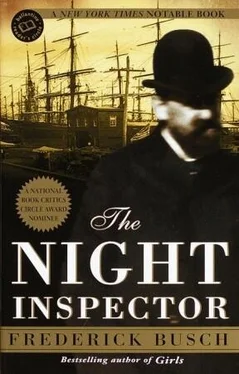One of the wagons down the block began to move toward us. The carter pulled the horse by his bridle, talking to the big, chestnut dray which did not seem to want to approach his fellow on the cobbles.
“And,” he continued, “I have come to regard this matter of fame as the most transparent of all vanities. Though, mind you, I will not diminish or disregard that most secret of all passions, ambition. I will confess to having been fertile ground for its seeds and its shoots. As potatoes turn to stone in the ground, as corn crops wither — and I have seen them dry into husks and curl and lie so low — so do other plantings. And, often, tender ambition may wither, and may never attain to the sweet, nourishing fullness of fame. And so be it.”
Sam kept writing as M fell into silence and as the wagon was turned in a circle, and the dray forced backward with it. Then the driver looped his rope around the long, heavy-looking head of the dead horse. He mounted his wagon and called up his horse, who responded. Off they went, at a slow walk, the dead fellow slapping and flopping and, finally, giving forth a belch from the muzzle, or a passage of wind from the flanks, which buzzed along the street and sent the urchins flying in a celebration of body noises, the final manifestation of life in the great corpse.
Waiting for Sam to finish, and to at last return his notebook to his inside pocket, we began our progress down West Broadway and then to West Street. We were silent for a time, but then Sam blurted — as if the thought had been compressed inside his head, pushing at his eyeballs and his forehead—“Sir! May I— Am I correct in inferring from what you told us that the absence of fame is the cause of this ‘annihilation’?”
M turned to me and gripped my arm with his powerful hand. He nodded as if in agreement with something that I had not said. “He’s a wonderful one, is he not? He studies the visual, clamps on to the audial, and he jots and jots and jots. I was not unlike you, Sam Mordecai. Although I must confess that I wrote only what paid until I saw that what paid I could no longer write. It was then , already having strayed some— Mardi? Do you ken it? And of course my great fish broiled in hellfire: There’s a meal to test your stomach! But then, Sam, I wrote what I would, not what they would have me write. And I served my ambition, though I killed off my fame. I inspected the slimy floor of the sea and the serpents under the floorboards in the cellar of the citizenry. Now, for that citizenry, I inspect the vessels that wallow behind the wind at the mouth of the North River.” He mildly belched, then stopped and pointed — we must needs stop and thus regard.
“Annihilation,” he said, “commencing before the condition of the posthumous sets in, and recompensing an old sailor at twelve hundred dollars per annum. Night duty paying no extra, for it is part of the job.” He looked at me as he said this last, and I smiled for his emphasis, which was meant, I thought, to reassure me about our arrangement. Of course, he did not see me smile in return.
We walked again, about to separate, for M must be at his job. I was prepared to leave assured, for we had talked of our schedule and of our concerns.
He combed his beard with his fingers and said, “One matter, Billy. It really is the matter. I will say it in the charging of this pipe.” He lifted a coarse, oily shag from a small leather pouch and, returning it to his pocket, began to tamp it by the single pinch at a time, into the charred, high bowl of his pipe, which, from the charring at its top and the oil of his fingers on the rest, was nearly black. “A man knows what is right,” he said, packing the tobacco down, “and he knows what is required. It seems to be my topmost thought, since I have spoken on it often to you, and moments ago most latterly, in fact. I must do for you what I must not do, on pain of punishment at law. I must do it for them , and in the name of humankind. I do believe this. You have convinced me, and I will act.” He had the pipe stuffed and tamped now, and he struck a match against the buckle of his belt and pulled it, trailing smoke and flame, up almost through his beard as he shielded the bowl from the wind with his other hand and sucked and sucked at the stem, so that the flame of the bowl dropped deep inside and then flared up past his fingers. “I must be undeceived in this. Tell me,” he said, “that I serve only the right.”
“I do believe it to be the case,” I said, “and I swear myself confounded not a little by the fact that I, too, engage in this transaction. For there’s no profit in it.”
“Except the moral,” Sam said, staring at me, perhaps remembering the woman to whom I had referred, perhaps posing me a question in his statement.
But M nodded his approval, and I did not reply to Sam.
M, around his pipe stem, said, “What do you say, Billy?”
“Why, I think I have said what I know and what I think. Does it not suffice?”
“It does,” he said, and Sam smiled tentatively. Then he looked behind us, and then looked grim.
M, walking west and away from us, paused. He asked, “What?”
Sam shook his head. “No, you must depart, sir.”
“But, Sam, what?” he asked.
“I was remembering a day in the hospital at Washington, when I visited Billy. He was in much discomfort. He was very brave. And I told him — I had to tell him of a horse I was forced to kill. I was not forced by any orders to do it.”
“I was hardly brave,” I said. “I killed like other men. And killed off other men. And of course you were not required by an officer to kill the horse,” I said. “You felt you had to as a kind of revenge.” To M I said, “The horse had killed a beloved sergeant of ours. Trampled him to death, in a panic induced by an artillery barrage.”
“A horse conjures forth from memory a horse,” M said. “The streets of New York bring forth the War. We live in several moments, several places, at once.”
Sam made a noise not unlike a gasp. He wrenched his notebook out.
“You have told him something crucial,” I said.
M, leaving us now, said, “Shipmates, it would be rewarding to think so.”
What I saw, as he went, was the face of the woman who had cared for me, and who, while Sam had nervously chattered like a squirrel, unwrapped and then rewrapped my face, this time with spaces for my eyes. Hers was the first face I saw. Her nose was broad and her mouth was small and tight. Her hair, curly with humidity and the color of tree bark, clung to her square head.
Her eyes had slid away from mine when she smiled an angry smile and said, “You see? I told you I was plain.”
“If you would come into this bed with me, I would worship you,” I said.
She flushed to her neck, but on her unfortunate, oily skin, it seemed a kind of rash. She said, “You’re regaining your health, I see, and growing rude as you do.”
“I would kiss every inch of your flesh with these scabrous lips,” I said.
Sam, I remembered noticing, had also flushed.
And her thick, square body had gone quite still, and then she had peered at me, her face still angry. “Liar,” she said, as if I had betrayed her.
Sam’s head had risen, and he was motionless in his concentration.
“Not so,” I said.
“No,” she mocked.
“But no,” I said.
And she had stared and stared, taking the measure of me, whose body she knew and which she had served so generously.
I looked back into her eyes.
Then she noisily took in a breath, and she turned her face from mine and carried away the soiled bandages.
And M, embarked now for the intersection of Laight and Washington Streets, and the thump of steam whistles, the clash of metal gears and the grinding of sea-soaked wood, called back as he strode his long paces away, “You ride your horse, Sam.”
Читать дальше












